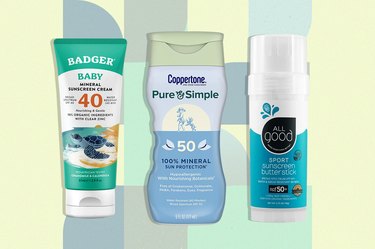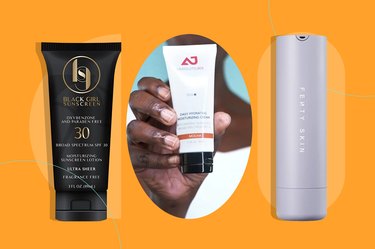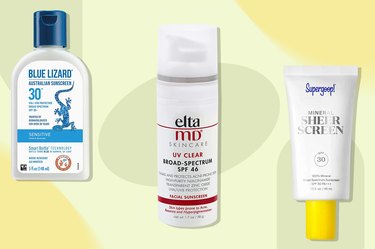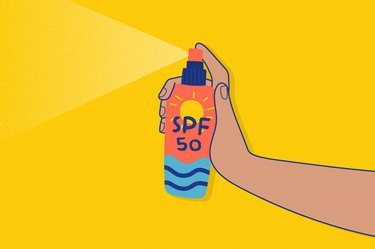
Protecting your skin from the sun is crucial for everyone to reduce the risk of skin cancer and premature aging, but it's especially important for people with lupus, an autoimmune disease marked by skin rashes, among other symptoms.
Here's why you should limit your sun exposure if you live with lupus, according to Maral Skelsey, MD, a dermatologist and the director of the Dermatologic Surgery Center of Washington, along with tips on how to keep your skin safe
Video of the Day
Video of the Day
Why You Should Limit Your Sun Exposure if You Have Lupus
Most people with lupus are photosensitive, which means spending time in the sun often results in itchy skin, a rash or a burning sensation, Dr. Skelsey says.
Even the slightest sun exposure can trigger a lupus symptom flare-up and cause reactions like a butterfly rash — redness that spreads across the cheeks and bridge of the nose.
This rash can last anywhere from a few hours to several weeks, and it can range from mild redness to swelling, irregular pigmentation and sores.
The sun can also cause breakouts on other parts of the body that have been exposed to sunlight, creating a scaly and circular rash.
Lupus flare-ups can cause other symptoms, too, like joint pain, fatigue and weakness.
What's more, sun exposure increases the risk of more serious conditions like skin cancer, Dr. Skelsey says.
"Patients with lupus already have increased susceptibility to skin cancer in areas that are scarred and depigmented," she says.
Tip
Dr. Skelsey says vitamin D deficiency is also often associated with lupus, but it’s better to get vitamin D through diet and supplements rather than via sun exposure.
How to Protect Yourself From the Sun
Avoiding the sun entirely likely isn't possible, but there are ways to protect yourself from sun exposure that don't have to interfere with your daily life. Here are the best sun-protection strategies for people with lupus, according to Dr. Skelsey.
1. Find Shade During Peak Sunlight
During the sunniest hours of the day, stay in the shade to stay cool and safe.
"Avoid the sun between the hours of 10 a.m. and 2 p.m.," Dr. Skelsey says. "If your shadow is shorter than you are, seek shade."
2. Wear Sunscreen Every Day
Applying sunscreen every day should be a non-negotiable. Dr. Skelsey suggests using a broad-spectrum sunscreen with an SPF of at least 60.
"Find sunscreen that suits you," Dr. Skelsey says. "There are oil-free versions if you have acne, sticks that won't drip into your eyes, foam that's better for hair-bearing areas and water-resistant versions when you're in the pool or exercising. Don't forget the top of your head!"
And remember to reapply every two hours, or sooner if you're sweating or in the water.
3. Avoid Tanning
Tanning is an absolute no-no, whether outdoors or indoors. Getting a tan may seem harmless, but it can result in serious skin damage and cause a symptom flare.
If you must have a tan, Dr. Skelsey recommends using self-tanners (aka sunless tanning products). Just remember to continue wearing sunscreen on top of your bronzed glow.
4. Wear Sun-Protective Clothing
Build a wardrobe with sun-protective clothing and accessories like hats and sunglasses.
Dr. Skelsey recommends these ready-to-wear clothing brands that can keep you safe in the sun:
Tip
You can turn your current wardrobe into sun-protective gear by using a UV protection laundry treatment, like RIT SunGuard, which increases the ultraviolet protection factor (UPF) of clothing to 30 and lasts for about 20 washings, Dr. Skelsey says. (For reference, a regular white T-shirt has about UPF 5.)
5. Protect Yourself in the Car
You might only think about sun protection when you're outside, but when you're in the car during the day, the sun can shine through the windows and expose your skin to UV rays.
Don't forget to apply sunscreen before you pull out of the garage, and you can also consider applying for a tinted windows permit to increase your level of sun protection in your car.
The laws on tinted windows in vehicles vary by state, but many state Departments of Motor Vehicles will issue a medical permit for them if you have lupus.
6. Consider Supplements
According to the Lupus Foundation of America, some lupus medications can increase your sensitivity to the sun. Medicines that can make you more photosensitive include:
- Antibiotics
- Anti-inflammatory drugs like ibuprofen, Advil and Midol
- Blood pressure medications
There are also supplements that can make you less sensitive to sun exposure, Dr. Skelsey says: "Talk to your doctor about taking oral supplements such as polypodium leucotomos that can diminish your UV absorption."
According to a January 2023 study in the Journal of Clinical Medicine, polypodium leucotomos extract contains antioxidants that may protect against skin damage and skin cancer from the sun.
These supplements should be used in addition to other sun-protection measures like sunscreen, though, not as a replacement.
7. Practice After-Sun Skin Care
If you've been in the sun, have an after-sun skin care routine that can help with irritation.
"Try a cooling shower, an unscented moisturizer with aloe vera or topical hydrocortisone cream if there is inflammation or sunburn," Dr. Skelsey says.
If you have any pain, skip topical pain medications and consider taking a pain reliever like ibuprofen or aspirin, Dr. Skelsey says. Topical benzocaine — the ingredient found in many topical pain relievers — can cause tenderness, itching and blisters, per the National Institutes of Health (NIH).
The Bottom Line
If you have lupus, limit your sun exposure as much as possible to avoid symptom flare-ups and complications.
Best practices for sun protection include wearing sunscreen and sun-protective clothing, avoiding tanning and finding shade during peak sunlight hours.
Is this an emergency? If you are experiencing serious medical symptoms, please see the National Library of Medicine’s list of signs you need emergency medical attention or call 911.





